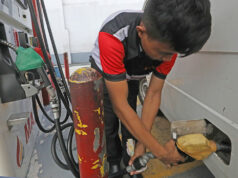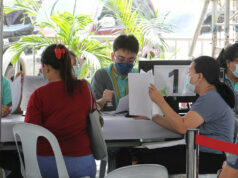Samal’s ‘bat mama’ steers bamboo industry development
A NEWLY-FORMED bamboo council in Davao — led by the lady known as the “bat mama” for her bat sanctuary and eco-tourism site in Samal Island — is aiming to make the region a major player in the emerging industry in four years through private-public collaboration.
“Give me four years and I will make Davao a major player,” Norma I. Monfort, head of the Davao Region Bamboo Council, said during the Nov. 17 opening of the region’s first bamboo products exhibit in Tagum City, Davao del Norte.
Ms. Monfort, who attended the first Mindanao Bamboo Summit in January, said she was driven to lead the industry’s development in Davao after learning that the region is considered a laggard.
“I will rally the private sector to plant bamboo… and coordinate with the government,” she said at the launch ceremony of the exhibit, which is supported by the Department of Trade and Industry.
Ms. Monfort said she will turn part of her Monfort Eco Tourism Estate into a bamboo farm and learning center.
“Bats and bamboo are allies in the fight against climate change,” she said, noting the numerous environment-friendly products that can be developed from bamboo.
Rod R. Bioco, president of the Bukidnon Giant Bamboo Resources Corp. and one of the key speakers during the January summit, said investing in post-harvest facilities is one of the most important components of the bamboo value chain.
“Central to the development is the bamboo post-harvest facility. Untreated and improperly dried, bamboo has little or no value,” Mr. Bioco said in an earlier interview with BusinessWorld.
“Without industrial scale post-harvest, we cannot build up our local bamboo industry to the global market… This is why critical is government support, especially in access to finance,” he said.
It was announced at the summit that state-run Development Bank of the Philippines has committed P1.2 billion to help jumpstart the Mindanao bamboo industry development program.
The program aims to have a million hectares of bamboo sites across the southern mainland over the next 10 years, with complementary infrastructure such as roads and processing facilities as well as a marketing program for various bamboo products.
The Mindanao Bamboo industry Council, composed of representatives from local governments and the private sector, will oversee the program.
The council estimates a global bamboo market of about $99 billion by 2026, with Europe, the US and Japan as the biggest buyers of bamboo and shoots.
The bamboo program is part of the Mindanao Development Authority’s Green Mindanao Project, which also promotes the development of high-value fruit farms and harvestable tree, particularly in denuded mountain areas. — Marifi S. Jara





